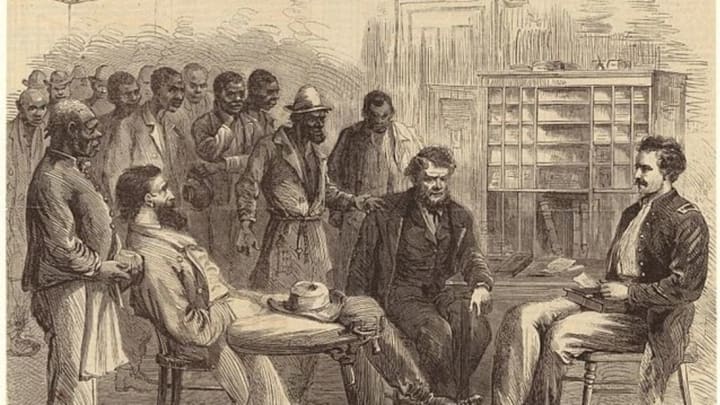For many African Americans, trying to get information about their family history can be difficult if their descendants were formerly enslaved people. However, Ancestry.com is looking to make the search far easier by providing free online access to millions of digitized records that can help trace the lives of Black citizens dating all the way back to the years immediately after the Civil War.
This information comes from the records of the Freedmen’s Bureau, a project launched in 1865 that sought to help millions of former enslaved Black people and poor white citizens in the South gain access to food, education, and housing following the war. Part of this program also included the creation of the Freedman's Saving Bank in March 1865, which was a financial institution dedicated to helping formerly enslaved people manage their money. The bank records were massive and had information like family members' full names and birth dates. In these archives, you'll also find marriage certificates, letters, and labor contracts from the Freedmen's Bureau.
Before these programs were established, enslaved people and African Americans weren't even counted accurately in the census, leaving information incomplete, erroneous, or nonexistent. That's why these records are an invaluable resource for people looking to trace their family history.
These records—complete with proper names and other information—were preserved by The National Archives and Records Administration. For years, the Smithsonian Institution has worked to transcribe the information, partnering up with programs and volunteers to digitize everything available to them. (In fact, they are still digitizing records today and are currently accepting volunteers.) The hope is that a partnership with Ancestry.com will grant wider accessibility to the records and allow families to learn more about their history.
Unfortunately, the Freedmen's Bureau was abandoned less than a decade after its founding as the country became more divided and as racial violence increased, especially with the spread of the Ku Klux Klan. The Freedman's Bank itself failed after Fredrick Douglass took over as the bank's director in 1874 and soon realized that the management team was defrauding patrons. Douglass desperately tried to save the bank by investing $10,000 of his own money into it, but it inevitably failed in the summer of 1874.
In a press release from Ancestry.com, professional genealogist Nicka Sewell-Smith said that “free access to this collection will enable meaningful Black family history discoveries for generations to come.” The database has more than 3.5 million records that can help many African Americans discover their lineage. For anyone interested in searching the free collection, head here.
